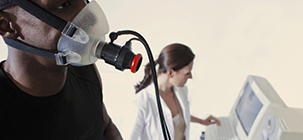Pulmonary Function Tests (PFT)
Jump
to Tests
Pulmonary Function Tests (PFT) monitor lung functioning, especially for those suffering from asthma, bronchitis, or COPD. Prominently, we use two techniques for PFTs - spirometry and plethysmography. Spirometry measures lung capacity (how much air you can inhale and exhale), while plethysmography measures lung capacity by inflating a balloon-like device attached to the cheeks.
A PFT is recommended if you are experiencing persistent shortness of breath, have a history of smoking, or are planning to have a lung transplant. Pulmonary function tests are used to diagnose various lung diseases, as follows:
- Chronic bronchitis
- Allergies
- Asthma
- COPD (Chronic Obstructive Pulmonary Disorder)
- Damaged lung tissues
- Lung cancer
- Infections
- Enlarged, stretched & thickened airways
- Scleroderma (thickening of the connective tissue)
- Weakness of chest muscles
What does PFT detect?
PFT is a valuable test if you are suspected or diagnosed with any respiratory disease or pulmonary disorder. Sometimes, symptoms do not provide accurate abnormalities and may interrelate with various respiratory diseases. Doctors can monitor chronic lung diseases, such as asthma or chronic obstructive pulmonary disease (COPD), through PFT. Also, find evidence for respiratory symptoms like wheezing, cyanosis, and dyspnea.
How will PFT feel?
Since the test involves some forced breathing and rapid breathing, you may have some temporary shortness of breath or lightheadedness. You also might have some coughing. You breathe through a tight-fitting mouthpiece, and you will have nose clips.
Follow the instructions for using the mouthpiece of the spirometer. A poor seal around the mouthpiece may cause results that aren't accurate.
PFT results:
- It takes around 15-30 minutes.
- Sometimes, pain medicines, severe fatigue, pregnancy, stomach bloating, and airway-affecting medicines can hamper the test results.
- A normal test result indicates that the respiratory system is working properly.
- If the test results are abnormal, the person may have a lung problem and need to consult a pulmonologist immediately.
Instructions:
- Avoid eating heavy meals before the test.
- Do not smoke for 4 to 6 hours before the test.
- You may have to breathe in medicine before or during the test.
- You will get specific instructions if you need to stop using bronchodilators or other inhaled medicines.




